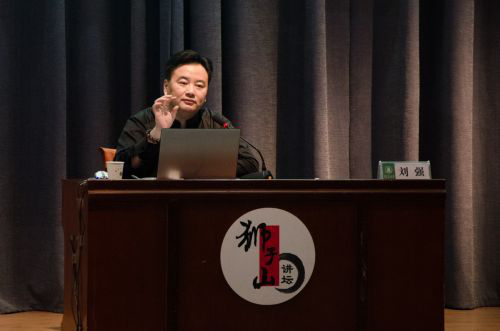Core Clue: On the evening of May 27th, Liu Qiang, Deputy Director of the Chinese Department and Director of the Poetics?Study Center of Tongji University, visited HZAU and gave a lecture about seven sages of the Bamboo Grove and Wei-Jin style.

Unveil Four Mysteries, Analyze Seven Sages
Liu Qiang told us that “Seven Sages of?the?Bamboo?Grove” actually had many mysteries that later generations couldn’t understand. Here he summarized four mysteries.
The first mystery was the number of people. Liu Qiang believed that “Seven Sages of?the?Bamboo?Grove” didn’t mean there were only seven people. This “seven” came from The Analects of Confucius, “The Master said, ‘some men of worth retire from the world. Some retire from particular states.Some retire because of disrespectful looks. Some retire because of contradictory language.’The Master said, ‘Those who have done this are sevenmen.’”. The second mystery was spreading method. In his view, it was the evaluation of later generations that generated and spread the good reputation of the Seven Sages, “Seven Sages were born in the Three Kingdoms and Wei-Jin period, but the reputation of Seven Sages was generated in the Eastern Jin Dynasty a hundred years later.”
The third mystery was the place. Liu Qiang said: “Bamboo Grove may not be bamboo grove in the real world.”According to the textual research of contemporary scholars, the Bamboo Grove may well be translated and grafted from Kalandaka Ve?uvana in Buddhist texts. It was not only a geographic concept but also a cultural concept. The fourth mystery was their meeting and departing. The departing of Seven Sages was closely related to the topside disputes at that time. The seven sages met each other as they hid from disputes, and they departed as things came to a close.
Reborn Style, Prosperous Culture
Liu Qiang gave his own understanding, “So-called Wei-Jin Style was a kind of social mores of pursuing nature, self and freedom, as well as a kind of personality bearing of transcended view of life values and aesthetic nature formed in the upper aristocracy.” Ethos like beauty, medicine, drinking and art in Wei-Jin Style also had a great influence on the society at that time.
Liu Qiang said: “For example, Wei-Jin period was the most developed time for character aesthetics when aesthetic view of men appeared.” This means that the multi-culture in Wei-Jin period promoted the change of women’s social status from aesthetic object to aesthetic subject.
Pursue Three Qualities, Pursuit Makes Style
The Seven Sages of?the?Bamboo?Grove pursued “nature”“self” and “freedom”. They believed the beauty of body is the beauty of nature. They retreated in mountain forest and kept intimate contact with nature.
At the same time, they pursued “self”, which meant to pursue maximum self-value. In political unrest period, they couldn’t express themselves directly, so they tried to seek self in the outside of rite and in liquor. And they valued feelings, seeking self in emotion.
Besides, they pursued “freedom”. They pursued freedom in seclusion and comfort in freedom. Therefore, spiritual freedom enabled them to become expert in literature and art and influenced the whole Wei-Jin Style.
At last, Liu Qiang concluded that “The spirit of Seven Sages is independence, freedom, transcendence, valuing feelings and advocating beauty.” He encouraged our students to live with character strength and personality like the Seven Sages.
(By Wang Jingjing)
http://news.hzau.edu.cn/2016/0528/45737.shtml